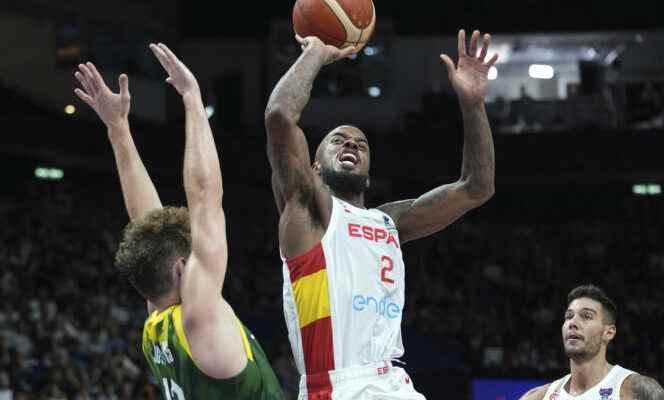The Spanish team owes a proud candle to its playmaker, born in Roswell, Georgia, United States, thirty-two years ago. Saturday, September 10, La Roja beat (94-102, after extra time) Lithuania in the round of 16 of the Euro basketball, pulled up by Lorenzo Brown, author of 28 points and 8 assists. His opponents took it badly. “I don’t know what this team would be like without Lorenzo Brown,” Lithuanian captain Mindaugas Kuzminskas wondered about the player who, before the start of the summer, had never imagined wearing the colors of Spain.
“It’s an absolutely legal resource, the only thing we did was follow a FIBA rule [Fédération internationale de basketball], just like many other teams big and small have done”, defended, at the end of August, the president of the Spanish Federation, Jorge Garbajosa, about his “rookie”. Naturalizing a player to fill a gap in a key position, the phenomenon is not new in basketball – and in sport in general. In 2017, Slovenia thus won the title of European champion, well helped by Anthony Randolph. A player “which doesn’t have much Slovenian”estimated at the time the French coach, Vincent Collet.
“Unfortunately it has become common, and all nations do it, but it will always shock me”laments the former pivot of the Blues, Frédéric Weis. “When I see a guy like Mike Tobey, who didn’t know where Slovenia was on the map before he took on the country’s jersey, I find it very average. » At the 2021 Tokyo Olympics, the neo-Slovenian, who had become an essential part of star Luka Doncic’s team, candidly replied that he had heard of his adopted country for the first time. ” when [on lui a] asked to make a passport”. Naturalized Croatian at the start of the summer, leader Jaleen Smith made a similar response on Friday, September 9. “I didn’t know where Croatia was, it was my first time [là-bas], but if a country wants you to come, why not take the opportunity to do so? “A national team is not a club, and we can’t do anything”retorts Frédéric Weis, Olympic vice-champion in Sydney (Australia), now a consultant for BeIN Sports.
Competitiveness above all
If twelve teams – half of the selections – at the Euro rely on a naturalized, the rules are not flexible. Unlike handball, in particular, basketball has established a strict rule on the subject to limit nationalities of convenience: since 1999, only one naturalized player per squad is authorized (out of twelve players). “It’s an honest compromise”, estimated, at the end of August, the secretary general of FIBA, Andreas Zagklis. Wishing to guarantee “competitive balance and sporting integrity”the international body, believes “to ensure that, to some extent, there are links between the players and the country they represent”. Whatever the discourse of the federation, it obviously has no control over the various national laws setting the rules for obtaining a passport.
You have 54.09% of this article left to read. The following is for subscribers only.
